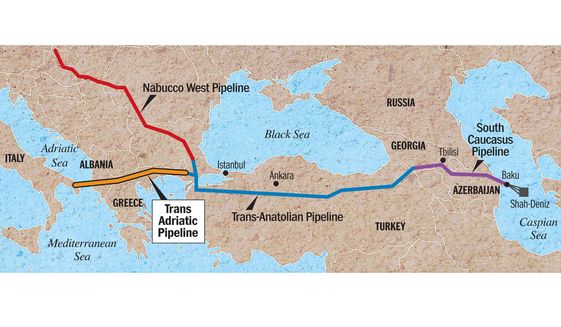By Nasimi Aghayev
Reading the newspapers, one could have the impression that the West’s energy supplies hang on a thread. The seemingly inexorable advance of the Islamic State in Syria and Iraq, rising tensions in the Persian Gulf, the disintegration of Libya and Yemen, the entrenched confrontation in Ukraine all suggest that the security of global energy supplies is more fragile than ever.
Yet in Eurasia, there are efforts underway to create a more robust energy market that will benefit Europe and the international community as a new network of pipelines — the Southern Gas Corridor, connecting the energy wealth of the Caspian with resource-hungry Europe — comes together. The Trans-Adriatic Pipeline, running from the Turkish border across the Balkans to Italy, has recently got final approval for construction; the Trans-Anatolian Pipeline — the preceding piece in the puzzle, stretching from Southern Caucasus along the length of Turkey to hook up with Trans-Adriatic Pipeline — broke ground in March. Further east, Europe’s energy commissioner has been in Turkmenistan to promote a Trans-Caspian Gas Pipeline to bring Turkmen gas to Europe.
At full capacity, the Southern Gas Corridor, which will stretch more than 2,100 miles and cross seven countries, will supply 60 billion cubic meters of natural gas: an essential new source in a world where supply growth from many other sources is limited or politically risky. And the Southern Gas Corridor pipeline and production projects, as well as the construction of the related infrastructure representing a total investment of approximately $45 billion, will not only bring secure energy, but also create tens of thousands of jobs in countries along the route, further strengthening Europe’s economic recovery.
At the heart of all of these projects is Azerbaijan, nestled in the Southern Caucasus between Russia and Iran. This isn’t new: Azerbaijan has been a reliable energy partner with the West for more than 20 years now, after the country opened up to international investment and partnership following the restoration of its independence from the Soviet Union. Since 2006, it has pumped nearly a million barrels of crude oil each day through the Baku-Tbilisi-Ceyhan oil pipeline to Europe, the U.S. and Israel, and much-needed natural gas through the Baku-Tbilisi-Erzurum gas pipeline.Unlike those pipelines, which were designed and driven by international companies, Azerbaijan itself is now a major player in the Southern Gas Corridor. The corridor will start in Azerbaijan, initially tapping into its giant, Manhattan-size Shah Deniz gas field. Azerbaijan’s state energy company, SOCAR, is also a major stakeholder in the Trans-Adriatic Pipeline and will operate the Trans-Anatolian Pipeline; and its input will also be essential if the Trans-Caspian Pipeline is built.
Azerbaijan’s own enormous reserves (2.6 trillion cubic meters) have driven the pipelines so far, and over the next 10 years, huge new natural gas fields will come on-stream to drive the next generation of projects.
But that’s not the whole story: Azerbaijan’s importance also lies in its vital geostrategic location, as a gateway to the oil and gas wealth of Central Asia. Without Azerbaijan, these resources will be locked away from Europe. Under the proposed plan however, Europe can look to a reliable source of reserves and begin to achieve real energy diversification and independence.
Accounting for almost 80 percent of the region’s economy and playing an instrumental role in all regional and trans-regional projects, Azerbaijan has become today a truly independent nation. But there are also challenges to be dealt with. In addition to the regional geopolitical complications, the country also faces aggression from Armenia, which has illegally occupied Azerbaijan’s Karabakh region since 1994 despite international condemnation.
Nevertheless, Azerbaijan remains committed to its strategic relationship with Europe. As the recent economic crises show, Europe needs reliable, stable partners who can support its quest for energy diversification. This isn’t just about oil and gas; this is also about the stability and growth of the international economy.
But a stable supply is nothing unless the supplier itself is stable. Azerbaijan has long understood this, and used the oil and gas revenues to power the country’s remarkable modernization and build a new generation of citizens open to the world. Today the poverty rate in Azerbaijan is around 5 percent, whereas in 2000 it was close to 50 percent. The unemployment rate is less than 5 percent. The gross domestic product per capita has increased 20 times since 1995 to reach $8,000 today. These facts alone are illustrative of the rapid transformation Azerbaijan has undergone. Under President Ilham Aliyev, the country has vigorously reinvested the wealth and benefits of its "black gold” into every level of society, and is now using this enormous resource to support humanitarian projects all over the globe.
In doing so, Azerbaijan is also building on a long legacy of tolerance and openness to the wider world. A staunchly secular Muslim-majority state, Azerbaijan has also embraced its flourishing, long-established Jewish and Christian communities, and continues to serve as a model of modern multiculturalism and interfaith harmony for the wider region. It is this cultural diversity and strong traditions of tolerance and inclusion, which are Azerbaijan’s other energy source, one no less potent than its oil and gas.
With Azerbaijan focused on sensible energy development, and with the EU and its neighbors on board, the Southern Gas Corridor is moving ahead, and is expected to begin delivering gas to Europe by 2019. This will be a crucial step forward for continued European growth, global stability and the enhancement of the partnership between Azerbaijan and the West.
Nasimi Aghayev is Azerbaijan’s consul general to the Western United States, based in Los Angeles.
www.ann.az
Follow us !






